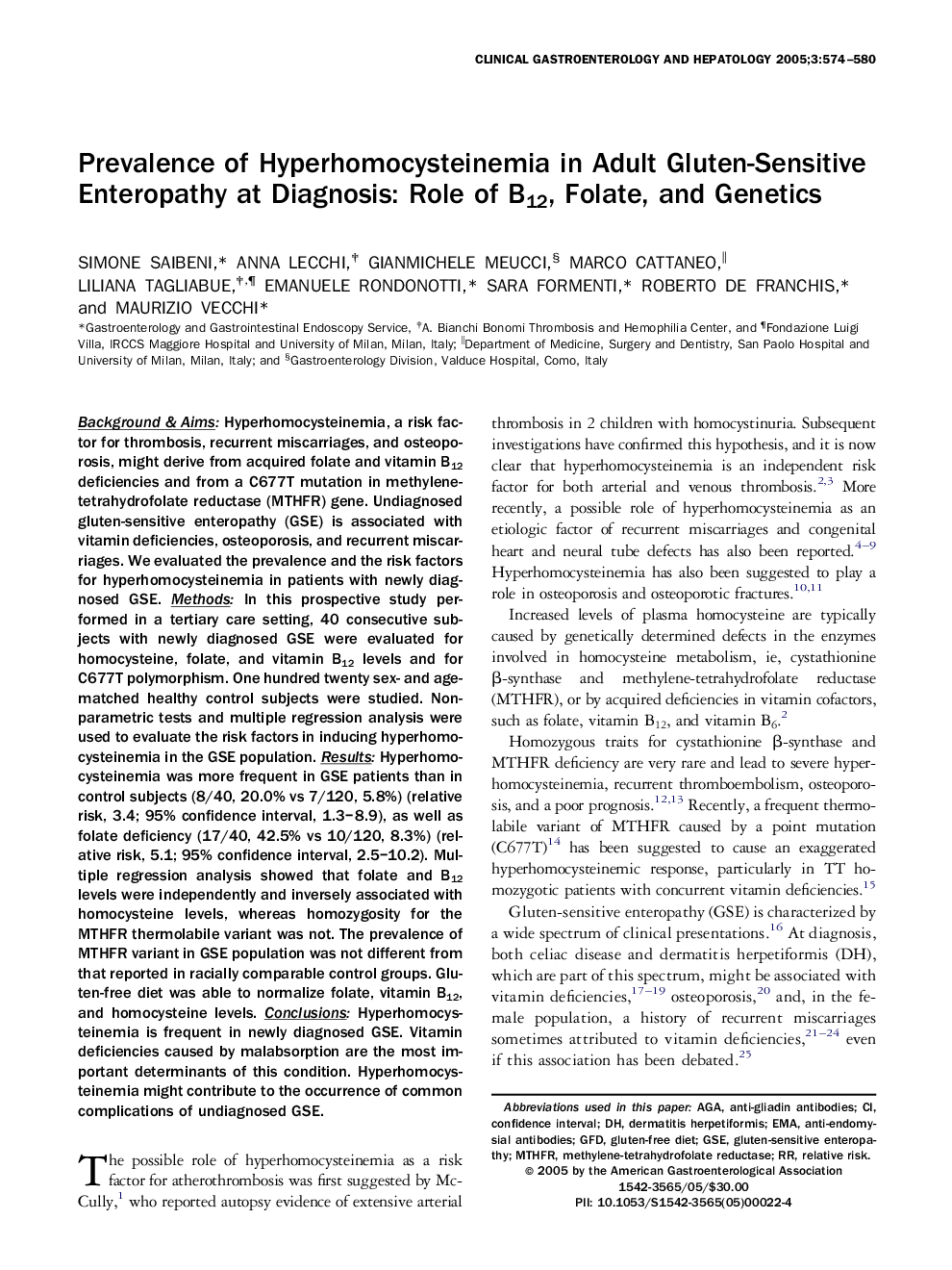| کد مقاله | کد نشریه | سال انتشار | مقاله انگلیسی | نسخه تمام متن |
|---|---|---|---|---|
| 9241721 | 1209241 | 2005 | 7 صفحه PDF | دانلود رایگان |
عنوان انگلیسی مقاله ISI
Prevalence of Hyperhomocysteinemia in Adult Gluten-Sensitive Enteropathy at Diagnosis: Role of B12, Folate, and Genetics
دانلود مقاله + سفارش ترجمه
دانلود مقاله ISI انگلیسی
رایگان برای ایرانیان
کلمات کلیدی
موضوعات مرتبط
علوم پزشکی و سلامت
پزشکی و دندانپزشکی
بیماریهای گوارشی
پیش نمایش صفحه اول مقاله

چکیده انگلیسی
Background & Aims: Hyperhomocysteinemia, a risk factor for thrombosis, recurrent miscarriages, and osteoporosis, might derive from acquired folate and vitamin B12 deficiencies and from a C677T mutation in methylene-tetrahydrofolate reductase (MTHFR) gene. Undiagnosed gluten-sensitive enteropathy (GSE) is associated with vitamin deficiencies, osteoporosis, and recurrent miscarriages. We evaluated the prevalence and the risk factors for hyperhomocysteinemia in patients with newly diagnosed GSE. Methods: In this prospective study performed in a tertiary care setting, 40 consecutive subjects with newly diagnosed GSE were evaluated for homocysteine, folate, and vitamin B12 levels and for C677T polymorphism. One hundred twenty sex- and age-matched healthy control subjects were studied. Nonparametric tests and multiple regression analysis were used to evaluate the risk factors in inducing hyperhomocysteinemia in the GSE population. Results: Hyperhomocysteinemia was more frequent in GSE patients than in control subjects (8/40, 20.0% vs 7/120, 5.8%) (relative risk, 3.4; 95% confidence interval, 1.3-8.9), as well as folate deficiency (17/40, 42.5% vs 10/120, 8.3%) (relative risk, 5.1; 95% confidence interval, 2.5-10.2). Multiple regression analysis showed that folate and B12 levels were independently and inversely associated with homocysteine levels, whereas homozygosity for the MTHFR thermolabile variant was not. The prevalence of MTHFR variant in GSE population was not different from that reported in racially comparable control groups. Gluten-free diet was able to normalize folate, vitamin B12, and homocysteine levels. Conclusions: Hyperhomocysteinemia is frequent in newly diagnosed GSE. Vitamin deficiencies caused by malabsorption are the most important determinants of this condition. Hyperhomocysteinemia might contribute to the occurrence of common complications of undiagnosed GSE.
ناشر
Database: Elsevier - ScienceDirect (ساینس دایرکت)
Journal: Clinical Gastroenterology and Hepatology - Volume 3, Issue 6, June 2005, Pages 574-580
Journal: Clinical Gastroenterology and Hepatology - Volume 3, Issue 6, June 2005, Pages 574-580
نویسندگان
Simone Saibeni, Anna Lecchi, Gianmichele Meucci, Marco Cattaneo, Liliana Tagliabue, Emanuele Rondonotti, Sara Formenti, Roberto de Franchis, Maurizio Vecchi,